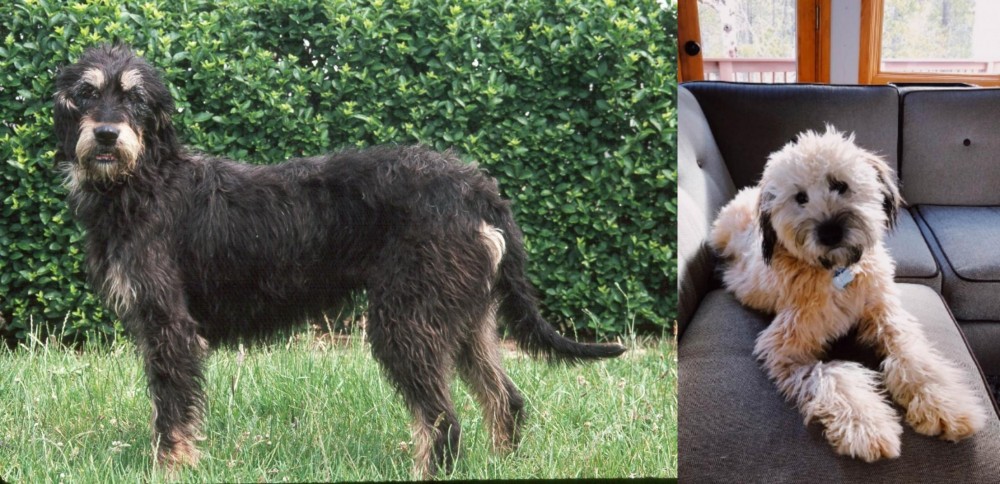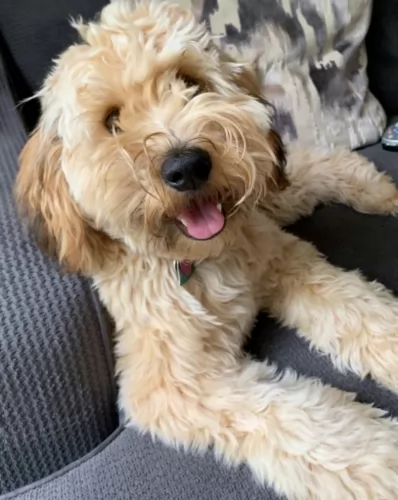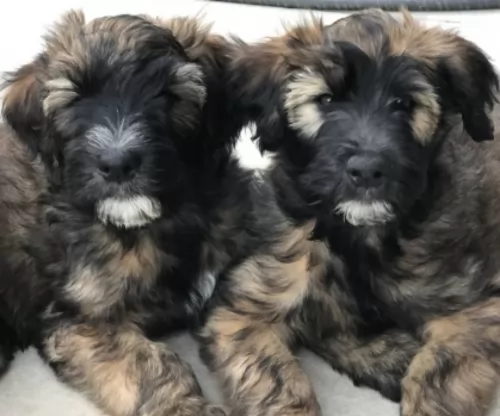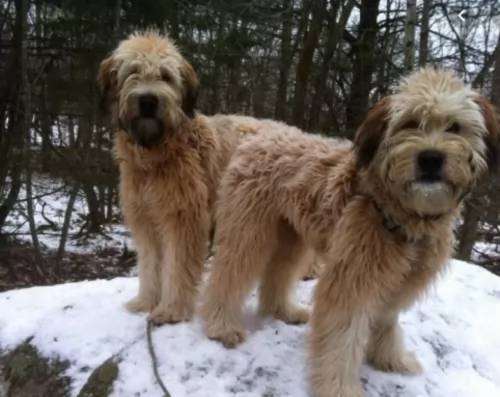 Petzlover
Petzlover Griffon Nivernais is originated from France but Whoodles is originated from United States. Griffon Nivernais may grow 12 cm / 5 inches higher than Whoodles. Both Griffon Nivernais and Whoodles are having almost same weight. Both Griffon Nivernais and Whoodles has almost same life span. Both Griffon Nivernais and Whoodles has almost same litter size. Both Griffon Nivernais and Whoodles requires Moderate Maintenance.
Griffon Nivernais is originated from France but Whoodles is originated from United States. Griffon Nivernais may grow 12 cm / 5 inches higher than Whoodles. Both Griffon Nivernais and Whoodles are having almost same weight. Both Griffon Nivernais and Whoodles has almost same life span. Both Griffon Nivernais and Whoodles has almost same litter size. Both Griffon Nivernais and Whoodles requires Moderate Maintenance.
 The Griffon Nivernais is a working breed dog originating in France and used as a hunting dog because of his exceptional scent skills and his alertness with hunting.
The Griffon Nivernais is a working breed dog originating in France and used as a hunting dog because of his exceptional scent skills and his alertness with hunting.
The idea was to develop a dog that looked much like the hunting dogs of the Middle Ages. French noblemen kept these dogs but the breed disappeared somewhat after the French Revolution, being restored again in 1925.
The restoration of the breed was done based on the Grand Griffon Vendeen but other breeds were also used such as the Otter- and Foxhounds. The breed has yet to receive official recognition by the AKC but it is recognized by both the FCI and the UKC.
 Known also as the Wheatenpoo or the Wheatendoodle, the Whoodle is a teddy-bear kind of mixed-breed dog, being a cross between Poodles and the soft-coated Wheaten Terrier.
Known also as the Wheatenpoo or the Wheatendoodle, the Whoodle is a teddy-bear kind of mixed-breed dog, being a cross between Poodles and the soft-coated Wheaten Terrier.
He came about in the mid-1900s so he is still quite a new breed. Like with most hybrid breeds, the Whoodle doesn’t have a well-documented history.
Because most hybrids hail from the USA, one can assume that the Whoodle comes from there as well.
 As a medium sized dog, the Griffon Nivernais stands at 55 to 62cm in height and weighs between about 22 and 25kg.
As a medium sized dog, the Griffon Nivernais stands at 55 to 62cm in height and weighs between about 22 and 25kg.
He is recognized easily by his distinctive rough or shaggy coat which is a grey with fawn around the muzzle and legs. Other colors can be black and fawn. Sometimes this blend of colors gives him a grizzled look in appearance.
He is also noted for the hairy eyebrows, a beard and mustache. He has dark brown eyes, black nose, long floppy ears and a tail that is held upright and with a slight curve. He is a muscular dog with a deep chest and a slight arch in the back.
Stubborn, courageous and independent, the Griffon Nivernais is a hunting dog with amazing scenting abilities. He is a dog used to working in a pack with other dogs so he tolerates other dogs well. He is a friendly dog, getting on well with children as well.
 The Whoodle is a medium-sized dog that stands at between 30 and 50cm in height and weighs in the region of 9 to 20kg.
The Whoodle is a medium-sized dog that stands at between 30 and 50cm in height and weighs in the region of 9 to 20kg.
He has a silky, medium-length coat that can be fairly straight or wavy and which is available in a range of colors – black, brown, grey, cream and red.
He isn’t a heavy shedder, but their hair can grow fairly long so he will have to be groomed one way or the other. Many people choose to have him trimmed at the doggy salon. With the Poodle being in the mix, it is thought that the Whoodle coat is hypoallergenic, sought after by dog owners who suffer from allergies.
Just because of the dog breeds your Whoodle dog comes from, you can know that you’re going to have a playful, happy, friendly, outgoing, social pet who will have no doubt inherited a lot of good qualities from both parent breeds.
He will happily settle down with you in the city or the countryside. He absolutely loves human company and isn’t the kind of dog to be put outside for hours separated from his humans.
If there are children in the home, they’ll discover that this little dog is always up for a game. He gets on well with children and other pets. Early training and socialization will be imperative for the Whoodle as he is a strong-willed dog, inclined to be stubborn and you want to make sure he is obedient.
 Your Griffon Nivernais is a sociable, stubborn, independent dog who loves to be around his human family members.
Your Griffon Nivernais is a sociable, stubborn, independent dog who loves to be around his human family members.
Socialization and training will do him good and round him off, making him obedient and responsive to your commands. He isn't an aggressive dog, but is even tempered and confident.
Exercise him well, feed him quality food, give him a nice warm, dry place to sleep, just like any other family member of yours, and you'll be rewarded with the companionship of a faithful, loving friend.
 The Whoodle is a hybrid dog – a mix between the soft-coated wheaten terrier and the poodle.
The Whoodle is a hybrid dog – a mix between the soft-coated wheaten terrier and the poodle.
They make splendid pets and companions and are cheerful and intelligent, wanting to be constantly by your side.
Because both of the parents are working dog breeds, he is an active dog too, loving to take part in all the activities his family is busy with.
When you bring this little teddy bear of a dog into your home, you’re going to have years of benefiting from a true canine companion.
 The typical lifespan for your Griffon Nivernais is 10 to 14 years. Even though you're highly unlikely to spend much time with him at the vet, there are one or two common dog illnesses worth knowing about -
The typical lifespan for your Griffon Nivernais is 10 to 14 years. Even though you're highly unlikely to spend much time with him at the vet, there are one or two common dog illnesses worth knowing about -
It is the fate of many dogs with floppy ears that they are prone to developing ear infections. You may notice him shaking his head canine, his ears may be red and there could even be a discharge.Get him to the vet as ear infections can be promptly treated with a course of medication.
Remember to have your Griffon Nivernais puppy vaccinated at 6 weeks of age. Puppies are vulnerable to horrible diseases which can sap the very life from them. These diseases are distemper, canine hepatitis, parvovirus as well as rabies. The puppy’s first vaccinations should be at 6 weeks of age followed by a second vaccination 2 to 4 weeks later.
 The Whoodle is considered to be a healthy little dog but they can suffer from some of the many common dog illnesses there are. It’s important to feed your dog well and to exercise him to ensure his good health. Some of the common health problems he could suffer with -
The Whoodle is considered to be a healthy little dog but they can suffer from some of the many common dog illnesses there are. It’s important to feed your dog well and to exercise him to ensure his good health. Some of the common health problems he could suffer with -
It is important to ensure your Whoodle has his vaccines to prevent some of the deadly canine diseases there are.
Also, it is a good idea to have your pet neutered or spayed to prevent an unwanted litter. Spaying and neutering have health benefits for your pet, so it is a good idea to have this done for them.
 This breed needs to be walked daily, and he needs a large space to run and play. Take him on walks, to the park, or give him a good game with ropes and balls.
This breed needs to be walked daily, and he needs a large space to run and play. Take him on walks, to the park, or give him a good game with ropes and balls.
In spite of his long, shaggy coat, the Griffon Nevernais doesn't need any special grooming and his shaggy coat will require brushing twice a week to remove loose hairs. When you brush him, you can also check for fleas and ticks.You get special flea combs for this. You can speak to your vet about recommendations too.
Because his coat is of a harsh texture it doesn't tangle or matt. Bathing will only be necessary when he becomes super dirty as too much bathing removes natural oils. He will need to have his nails trimmed if they don't wear down naturally, and he will also need to have his ears cleaned to keep them free of wax and dirt and to prevent ear infections.
Brush his teeth 2 or 3 times a week will also help towards preventing dental disease.
He is a high energy dog so he will need to get top quality food. You can feed him the best commercially manufactured food but its to his advantage to include some home-made food too such as cooked chicken, brown rice and vegetables. He'll also need some raw meat from time to time and a constant supply of fresh, cool water.
 Apart from your Whoodle requiring regular nail trimming, you will want to brush him twice a week to keep their coat free from matting. Some Whoodle owners prefer to have their pets professionally groomed.
Apart from your Whoodle requiring regular nail trimming, you will want to brush him twice a week to keep their coat free from matting. Some Whoodle owners prefer to have their pets professionally groomed.
Check inside his mouth while grooming to ensure there are no bad teeth. This could cause your pet a lot of pain and he has no way of telling you this.
As a medium-sized dog, you want to feed your pet a commercially manufactured dog food that has been formulated for a medium-sized dog and one with lots of energy.
Their dietary needs change from puppyhood to adulthood and where the puppy received 4 bowls of food a day, the adult Whoodle will require 2. Always buy the best quality food you can as the choice of food you provide has a huge impact on his health.
Some home-made food is always a good idea too but it needs to be simple and plain, without any exotic spices. Boiled chicken, rice and vegetables is always a splendid choice and it can be added to the dry kibble as a supplement.